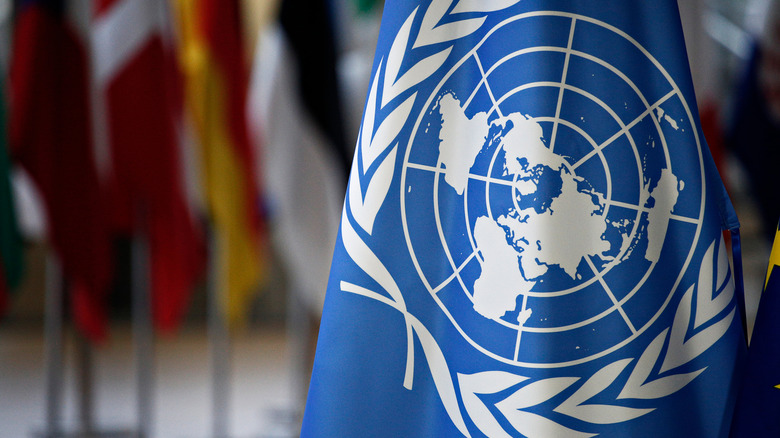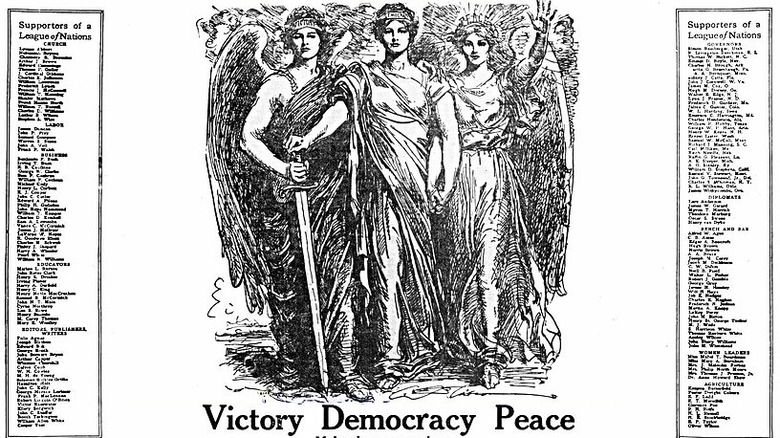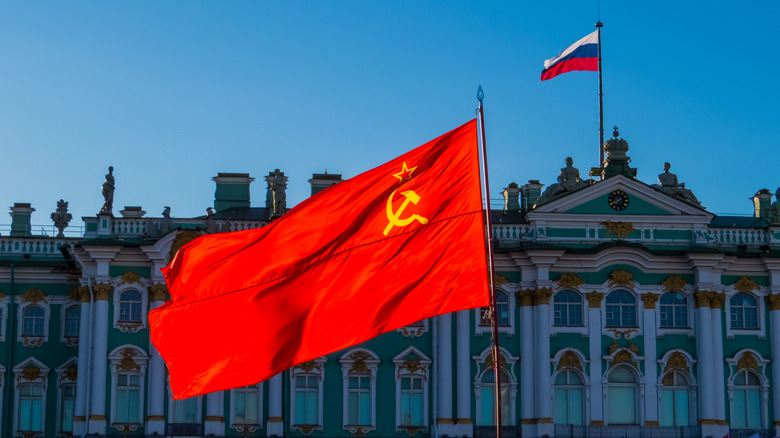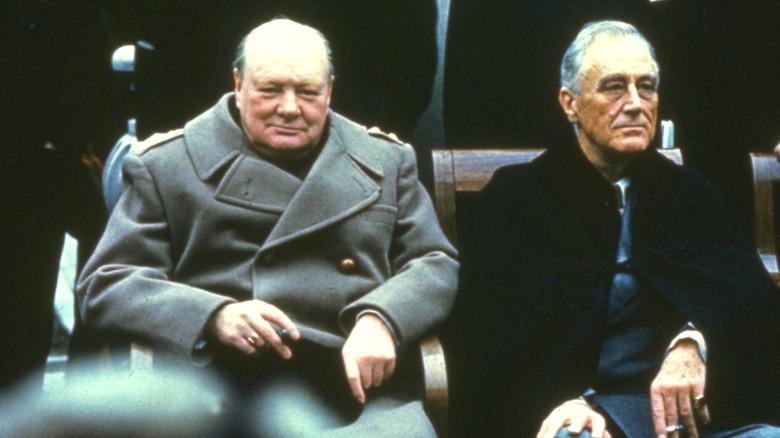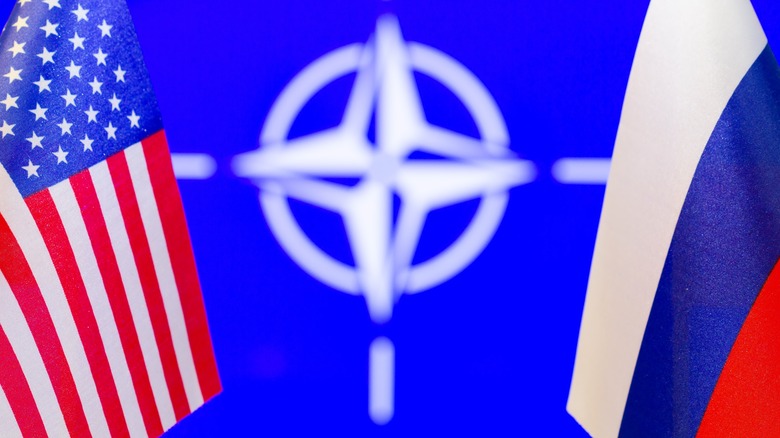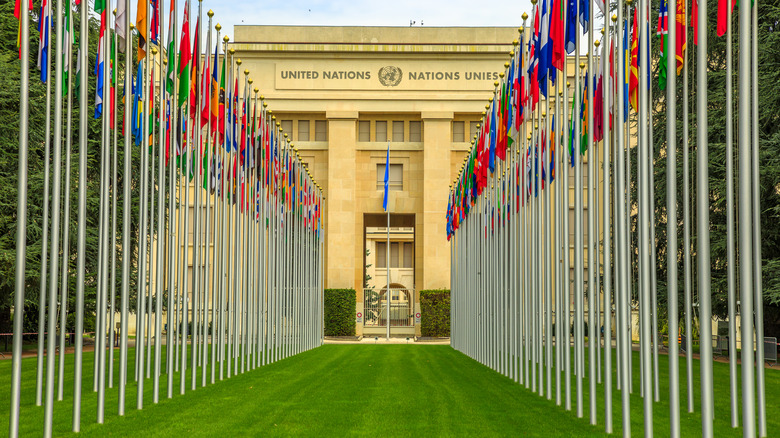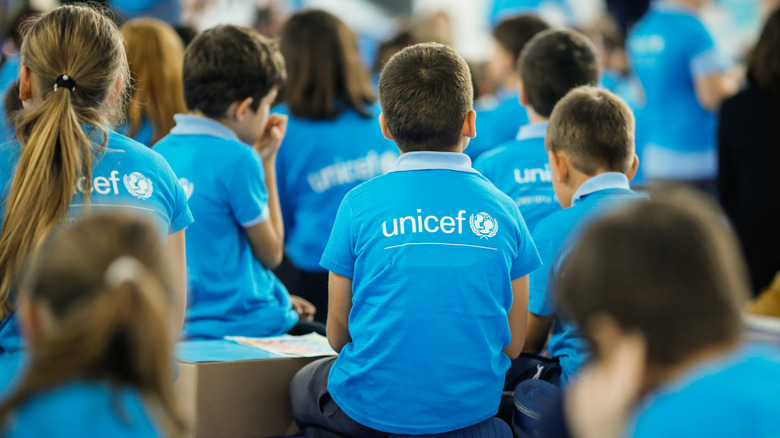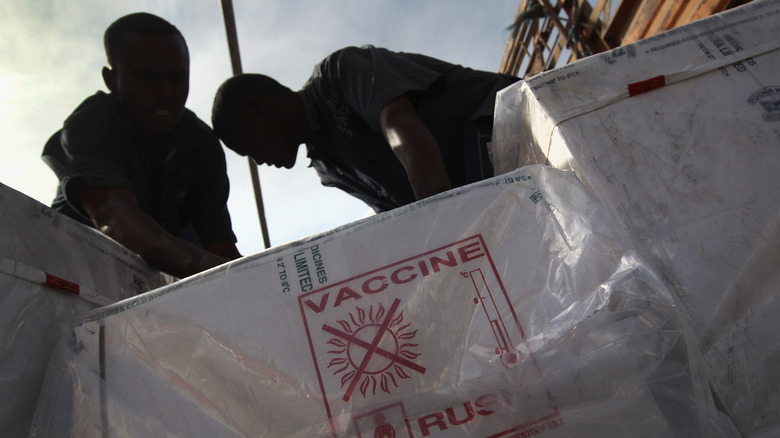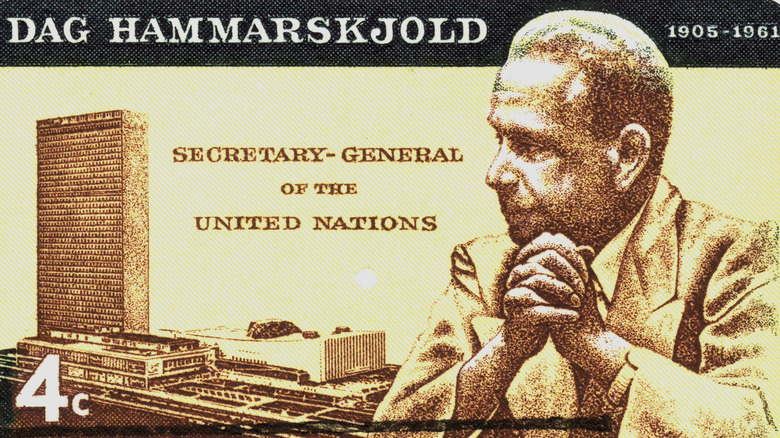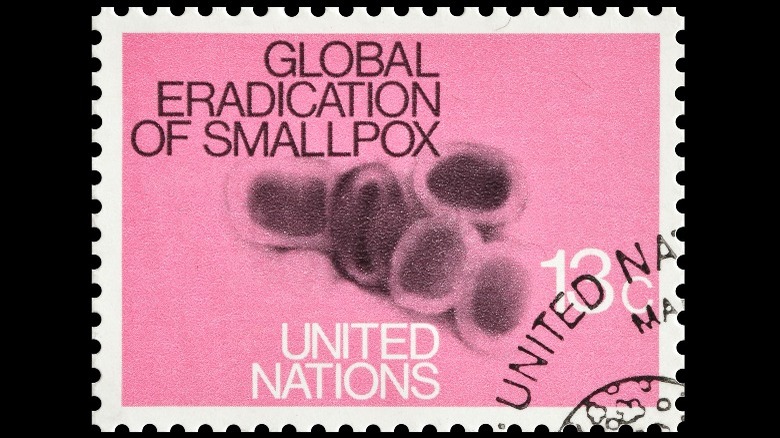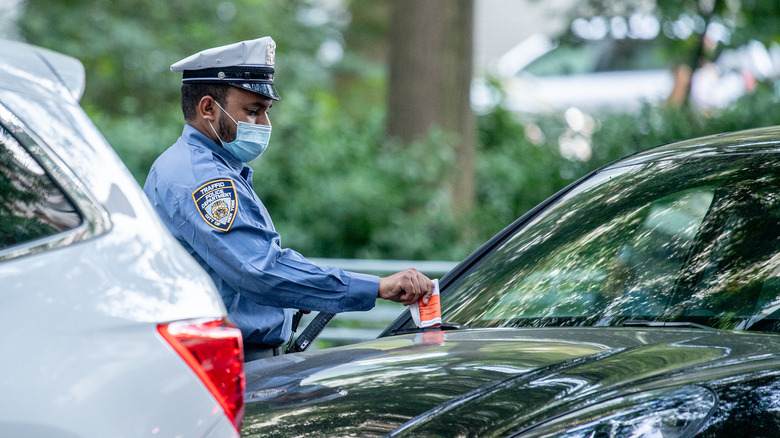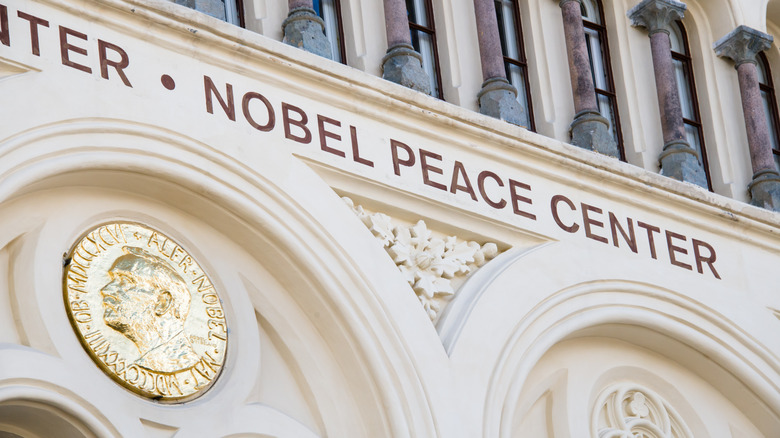The Untold Truth Of The United Nations
The United Nations is famous mostly just for being the United Nations. It exists, and we hear people talk about it whenever there's a conflict somewhere in the world. It's probably safe to say that the average person's understanding of the U.N. boils down to the fact that it makes rules that the whole world is expected to follow, it says stuff when countries don't follow those rules, and it sometimes sends "peacekeepers" into war zones. (U.N. peacekeepers, by the way, are not to be confused with Hunger Games peacekeepers who were basically just off-brand storm troopers with better aim.)
So from most people's perspectives, the United Nations has a lot of untold truths. That's not because it's a shadowy organization or because it has a lot of sinister secrets or anything, it's mostly just because the average person doesn't pay much attention to its existence until everyone's general survival starts to depend on it. And because wars involving one or more nuclear powers are kind of a matter of everyone's survival, well, it's about time we all learned some of the U.N.'s untold truths.
Before the United Nations, there was the League of Nations
Today we know that the name "League of Nations" just sounds way too much like "Justice League" and since basically no one wants to picture world leaders sitting around a table in skintight leotards and capes, it's something of a relief that this predecessor to the United Nations no longer exists. The League of Nations was sort of like the U.N. 1.0 in that it was formed after a world war in the hope of preventing similar world wars (via U.N. Geneva). Established in 1919, the League of Nations did some decent work mediating disputes between Greece and Bulgaria and Sweden and Finland, which is a pretty okay accomplishment if you forget for a moment that Sweden and Finland have about as much chance of breaking into violent conflict as two lambs and a manatee but anyway, good for them. When it came to Japan's occupation of Manchuria and Hitler's invasion of Austria, though, the League probably did wish at one point it had some skintight leotards and capes and the superpowers that come with them.
According to the U.N., after the League of Nations rather embarrassingly failed to prevent World War II (despite all its big talk about "promot[ing] international cooperation" and "achiev[ing] peace and security"), it remained ineffectively present until 1946, when the newly-formed United Nations asked it to hand over all its stuff and it finally went slinking off into obscurity.
The USSR was one of the charter members of the U.N.
If you grew up during the 1980s, you knew that the Soviet Union was the center of the world's evil and that it had 17 million nuclear missiles pointed at your house and any day now you and everyone you love were going to be vaporized. Millennials, this is why Gen X just really does not care about your problems. But there was a time, long, long before the Cold War traumatized everyone on Planet Earth, when the U.S. and the USSR were allies. America and the Soviet Union were on the same side during World War II, in fact according to the U.S. Department of State, the Allies might not have even won the war if it hadn't been for the Soviet Union's contributions on the Eastern Front. So at the war's end in 1945, it would have seemed nonsensical to exclude our dear friends and fellow victors from the signing of the U.N. Charter (via United Nations).
Despite all the early kumbaya-ing, the Cold War officially started before the ink on the U.N. Charter had even dried. On July 25, 1945, the United States got together with the United Kingdom and the Soviet Union to discuss their post-war plans, and that was when it started to become obvious that the Soviets wanted to, you know, take over the world. Animosity ensued, and the rest is Cold War history.
The inspiration for the name 'United Nations'
You're probably wondering who was the super genius who came up with the name "United Nations." Or you might not be, because let's face it, it really doesn't take a super genius to come up with an uninspired name like "United Nations." The fact that it was two of the time's most accomplished wordsmiths makes the U.N.'s lack of a super-cool name even more baffling.
Yes, according to the U.N. itself, the guy who is famous for saying "If you're going through hell, keep going" (Winston Churchill) and the guy who is famous for saying "The only thing we have to fear is fear itself" (Franklin D. Roosevelt) were not able to use their combined intellects to come up with a better name than "United Nations." To be fair, "League of Nations" was already taken and maybe they were a bit concerned about the cape and tights thing, but surely they could have picked something at least slightly cooler, like "The United Annihilators of Conflict" or "The Fists of Peace." Okay so maybe those aren't great names or anything, either, but let's face it, if the U.N. was called "The Fists of Peace," it probably wouldn't have nearly as many untold truths because literally everyone would want to know what it was up to.
Technically, Russia isn't a member of the U.N. Security Council
The Soviet Union was a charter member of the United Nations. But the Soviet Union no longer exists, which makes things, well, kind of complicated. According to the Conversation, Russia's recent bad behavior has created questions about its place on the U.N. Security Council. After all, Russia isn't even supposed to have that seat because it technically belongs to the Soviet Union.
If you're wondering how the U.N. let that slide for 30 years, well, they didn't. After the USSR fell apart in 1991, the former Soviet republics decided that Russia should take over the old USSR's seat on the Security Council. Russia asked the U.N. if that was cool, the U.N. said "yes," and that was that.
Today, some legal experts question that decision. The USSR no longer exists, they argue, and because Russia can't claim to be a continuation of a country that no longer exists, it doesn't have a legitimate right to that non-existent country's seat on the Council. So is Russia going to get the boot? Probably not. Like diamonds and seats on the Supreme Court, the Security Council is forever. And since there's a remote possibility that the United Kingdom might one day break apart like the Soviet Union did, well, let's just say that England probably doesn't like what that might mean for its future with the U.N.
Here's an idea, let's make war a tiny bit less horrible
For centuries, human beings have understood that war stinks. It's not like people emerged from World War II with lightbulbs over their heads and said to each other, "You know what, war was supposed to be super fun but that was totally un-fun." War has been devastating families and communities since the first caveman clubbed his neighbor with the back leg of a mammoth and said "ugh." So it's unclear why it never occurred to anyone to, you know, write down a couple of rules outlining the fundamental rights of human beings.
To be fair, the United Nations says human beings have made half-hearted attempts to regulate war for centuries, but it wasn't until relatively recently that people started to get mad when governments would rip out a living person's innards and burn them in front of his face while spectators cheered and ate crumpets (looking at you, England). The 1899 Hague Conventions was the first real attempt to outlaw certain wartime actions but the real word on what's cool and what's not cool during armed conflicts came with the Geneva Conventions in 1949. Among other things, the Geneva Conventions outlawed torture, hostage-taking, "wilful killing," attacking civilians, faking a truce flag, and destroying hospitals or objects of art, culture, or science. These don't exactly sound like modern ideas, but they are wholly modern ideas that might not have ever been written down if it wasn't for the U.N.
They don't just do war
The U.N. is known for its peacekeeping operations, but that's actually a small percentage of what they do. In fact, according to the Guardian, the money the U.N. spends on military stuff is only about 1% of what the United States spends on its military, so either they're being totally under cautious or the U.S. is maybe overspending on the military. Who knows.
In its spare time, the U.N. does a lot of humanitarian stuff. It has an initiative to end hunger (the World Food Program) which it describes as "the world's largest humanitarian organization." The program is staffed by 20,000 people and provides food to people in more than 80 different countries. And just in case you're picturing C10s just dropping crates of food and flying off, there's also a "teach him to fish" aspect of the program. WFP also helps farmers increase crop yields and reduce losses, with the goal of not having to deliver so much food once farmers can produce enough for everyone.
The U.N. also has a list of "Sustainable Development Goals," and Goal #1 is "end[ing] poverty in all its forms everywhere." In case you think that's lofty, the U.N. is also the driving force behind UNICEF, and UNICEF's goal is "to save children's lives, to defend their rights, and to help them fulfill their potential, from early childhood through adolescence." Also, they never give up. It says so right there on UNICEF's "What We Do" page.
They also do vaccinations
There are certainly folks out there who see vaccination distribution as an act of evil, but let's be a little more science-y and call it a seriously big humanitarian effort. Even before the COVID-19 pandemic, UNICEF, which stands for "United Nations Children's Fund," somehow, has been involved in distributing vaccines in places like sub-Saharan Africa, where access to them has been historically limited (via the U.N.). In 2019, it worked with partners to negotiate lower prices for the measles vaccine, to identify areas with low vaccination rates, to find a solution to the problem of keeping vaccines cold in places without electricity, and to figure out how to put microchips into syringes. Just kidding! There are no microchips in vaccines.
Since 2021, the U.N. has shifted its focus a bit, for obvious reasons. According to the U.N., the World Health Organization (also a part of the U.N. System) and UNICEF, along with partner organizations, put together a "Global Access Facility" designed to make it easy for any nation to obtain COVID-19 vaccines. So far (as of September 2021) more than 5.5 billion doses of vaccine have been administered worldwide, though that's still not super close to the ultimate goal, which is to vaccinate 70% of the world's population or 7.8 billion people. Still, 5.5 billion is a huge number, and the U.N. gets to take at least some of the credit for that.
What happened to Dag Hammarskjold?
Dag Hammarskjold isn't exactly a household name, probably because most people living in most households have no idea how to pronounce "Hammarskjold." It's okay, probably no one at the U.N. knew how to pronounce the name of their own second Secretary-General, either. According to History, Hammarskjold held his position at the top of the organization until 1961, when the airplane that was taking him to a secret meeting in the newly independent Republic of the Congo (called the Democratic Republic of the Congo today) mysteriously went down in a forest not far from its destination. The people who were expecting him were weirdly cool with the fact that his plane seemed to have vanished, and no one ordered a search until hours after locals reported seeing a big "flash."
U.N. officials almost immediately suspected foul play, but there wasn't really any evidence so the case went cold pretty quickly. In 2017, there was some renewed interest at the U.N., and a judge was appointed to look into the old case. His investigation was inconclusive, though he did say that "an external attack or threat" was plausible.
So who killed him? There are theories. For a start, the U.N. had recently gotten mixed up in the conflict between separatists and the Republic of the Congo's new government, and plenty of people were still mad about it. It seems possible — even probable — that Hammarskjold's death was an assassination.
The U.N. issues its own stamps and has its own post office
The United Nations has headquarters in New York City, Nairobi, Kenya, Vienna, Austria, and Geneva, Switzerland. All of its other various organizations, which fall under the umbrella of the "U.N. System," have headquarters in many different parts of the world, too. So, the U.N. has its own stamps because reasons.
Now, all those different U.N. locations are certainly impressive, but let's consider for a moment that 7-11 has more than 70,000 locations (via Statista) and so far has not felt the need to start its own post office. Of course, technically speaking, the U.N. is not a part of any one nation but is kind of like all nations mushed up into one. In fact, when you walk into the U.N. building in New York City you're considered to be in international territory (via United Nations Impact Report), which means you don't have to pay sales tax on any of the overpriced pins and postcards they sell in the gift shop. Yay.
Anyway, according to the U.N.'s own Postal Administration, the United Nations issues stamps in three currencies: U.S. dollars, Swiss francs, and euros. Sadly, there isn't a U.N. post office in every U.N. System headquarters, though. The stamps can only be used if you're sending mail from one of the three U.N. offices in New York, Geneva, or Vienna, so it's ... sort of a time saver if you're in one of those three places?
U.N. officials don't have to pay parking tickets
Being on international territory on international business has other perks besides just cheap gift shop merchandise. If you're a U.N. official, you don't have to follow all of New York's arbitrary rules, which means you get to park anywhere you want and thumb your nose at the person on the silly looking meter scooter, because that person isn't already humiliated enough by having to drive around on a silly looking meter scooter all day long.
That by itself doesn't stop the meter people from issuing the parking tickets, though. In fact, according to the Guardian, United Nations diplomats owe a total of around $16 million in unpaid parking tickets, not that "owe" is even the right word because they're under no legal obligation to pay those tickets. It's the same story in Canberra, Australia (A$500,000) and London (£477,499, though to be fair, at least some of that amount has been either paid or forgiven). London also has a thing called a "congestion charge," which is basically a fee you're supposed to pay if you drive in a designated high-traffic "congestion charge zone." Diplomats owe about £100 million for that, though who can blame them, really? It's unlikely there are many people reading this who would be like, "I know I don't have to pay this congestion charge but I'm totally gonna because I'm that kind of awesome person!" Not human nature, sadly.
No one's ever left the U.N.
You have to have committed an awful lot of transgressions to lose your spot in the United Nations. Evidently, you can even invade another sovereign nation and you still get to be the president of the United Nations Security Council (via the Conversation).
That doesn't mean there's no way for the U.N. to kick out a state if it's misbehaving, though. To do that, they just need a recommendation from the Security Council, and then the U.N. General Assembly votes on the recommendation. By the way, Russia has a veto on the Security Council, so Russia will never be kicked out of the U.N. because Russia can veto any effort to do so, forever and ever, no matter how many nuclear bombs they explode.
Anyway, no one else has ever been kicked out of the U.N., either. But one country did voluntarily withdraw, at least temporarily. In 1965, Indonesia announced in a letter addressed to the Secretary-General (via JSTOR) that it was quitting the United Nations, mostly because it was miffed that the U.N. was going to let rival Malaysia have a seat on the Security Council. Indonesia's tantrum was pretty short-lived, though. Later that year there was a coup in Indonesia, followed by a new government, and the new government was all, "Can we come back now?" The U.N. said "sure," and its record of never losing any members (at least not permanently) remains intact.
The U.N. has 12 Nobel Peace Prizes
If you went over to the U.N.'s house for a beer, it would totally bore you by showing you its massive pile of Nobel Peace Prizes. And because it has 12 of them, you'd have to pretend to be interested in all 12 stories about all of the worldwide peace stuff it's been doing for the last three-quarters of a century or so. Yawn.
Just kidding, the fact that organizations under the U.N. System umbrella have wracked up so many Peace Prizes is commendable, though, in a way, it's kind of icky for them to take credit for all of them since technically the U.N. itself has only won the Peace Prize once, and it had to share the award with Secretary-General Kofi Annan. Other U.N. System winners include Dag Hammarskjöld, who got the prize posthumously (via the U.N.), the Intergovernmental Panel on Climate Change and Al Gore, and the entire U.N. Peacekeeping Forces. In 2020, the World Food Program won the award for its work combatting food insecurity during a pandemic (via the U.N.).
So yeah, the U.N. does "peacekeeping" which means it also does war, but its humanitarian work around the world and its unwavering efforts to make the world a better place eclipse most of what any other nation could do single-handedly. And they've got 12 Nobel Peace Prizes to prove it. Sort of.
